Shih Tzu Potty Training Problems: Real Struggles, Honest Solutions

Potty training is one of the most important milestones in a dog’s early life—but when it comes to Shih Tzus, this journey can feel longer, more emotional, and a lot more complex than with many other breeds. These fluffy little companions bring joy, warmth, and character into any home, but they’re also known for their stubborn streak and sensitive nature, which can make potty training a genuine challenge.
This article takes a deep, realistic look into Shih Tzu potty training problems, exploring what they are, why they happen, and how to genuinely help your dog—and yourself—get through them. You’ll find honest insights, practical guidance, and some much-needed reassurance along the way.
Understanding Shih Tzu Temperament
The Shih Tzu is an affectionate, people-loving breed with a reputation for loyalty and companionship. However, they are not always eager to please in the way other breeds are. This doesn’t mean they’re untrainable—it simply means they respond better to calm consistency and reward-based methods than harsh discipline or rigid demands.
Their small size also plays a role in the potty training process. Shih Tzus have tiny bladders and limited physical capacity to “hold it in” for extended periods. Combined with their easily distracted, curious personalities, it’s not surprising that house training becomes a common frustration for many owners.
What Is Shih Tzu Potty Training Problems?
When we refer to “Shih Tzu potty training problems,” we’re talking about the collection of recurring difficulties owners face while housebreaking this breed. These issues are not rare—if you’ve felt like your Shih Tzu “just doesn’t get it,” you’re far from alone.
These problems can range from frequent indoor accidents, to confusion about where to go, to regression after initial success. Many Shih Tzus also display a puzzling behavior of peeing or pooping indoors immediately after being taken outside. Others might start urinating on soft surfaces like rugs, beds, or piles of laundry.
These aren’t signs of disobedience—they are signs of miscommunication, unmet needs, or anxiety. Understanding this distinction is the first step toward solving the problem.
Why It Happens
The first major cause of potty training problems in Shih Tzus is inconsistent schedules. These dogs thrive on predictability. If they are fed or taken out at different times each day, it becomes incredibly difficult for them to anticipate when and where they should relieve themselves.
Another major factor is their limited bladder control. Especially during puppyhood, Shih Tzus simply can’t wait long between breaks. If they’re left alone for hours or not given enough outdoor time, accidents are almost inevitable.
Additionally, early training mistakes—like overuse of pee pads or punishing accidents—can create confusion and fear. Dogs trained on pee pads often struggle to transition outdoors because they associate relief with indoor surfaces. And when they’re scolded for accidents, they may learn to hide or sneak off rather than signal their needs clearly.
The Emotional Toll on Owners
Let’s be real: dealing with a dog that keeps having accidents in the house can be exhausting. It’s easy to feel frustrated, disappointed, even defeated. You might wonder if you’re doing something wrong—or worse, if your dog is doing it on purpose.
But here’s the truth: Shih Tzus aren’t spiteful. They’re not trying to upset you. They’re simply trying to navigate a confusing world, and they need your help, not your anger.
Understanding the emotional aspect of training is important. When frustration builds, it affects the tone you use, the patience you have, and the overall bond you’re building. That’s why it’s crucial to approach potty training with empathy—for your dog and for yourself.
The Real Benefits of Overcoming These Problems
Solving potty training issues isn’t just about saving your carpet or couch. It brings broader benefits that improve the entire relationship between you and your Shih Tzu.
A consistent potty routine helps your dog feel safe and secure. Dogs thrive on routine, and knowing when and where to go builds their confidence. It also reduces stress for both of you—fewer accidents mean less cleanup, fewer frustrations, and more peaceful days.
In the long run, solving potty training sets the foundation for other kinds of learning. Once your Shih Tzu understands this basic expectation, they become more receptive to commands, leash manners, and even grooming sessions. Success builds success.
What Actually Works
To help your Shih Tzu overcome potty training problems, the first and most effective step is to establish a consistent routine. This includes regular feeding times, regular walk or potty times, and minimizing surprises or changes to their schedule.
For example:
-
Take them out first thing in the morning
-
Again 10–15 minutes after each meal
-
Once after naps
-
Once before bed
-
And ideally, every 2–3 hours during the day (especially for young puppies)
Choose one designated potty area outdoors, and return to it every time. This helps your dog associate the place with the act of elimination, and over time, that familiarity creates a natural reflex.
Use positive reinforcement every time they go in the right spot. That means offering praise, treats, or a gentle tone immediately after they do their business outside. Avoid delayed reactions—it has to be instant so the dog connects the reward with the behavior.
Crate training can also be a powerful tool. A properly sized crate (not too big, not too small) mimics a den, and most dogs will avoid soiling the area they sleep in. Use the crate when you can’t supervise, but always take your dog out immediately after they’re released.
One more crucial tip: clean up all accidents thoroughly using enzymatic cleaners. If you don’t, your Shih Tzu may return to that spot due to lingering scent markers—even if it smells clean to you.
What to Avoid
Punishment-based methods don’t work with this breed. Shih Tzus are sensitive and emotional. Yelling, scolding, or pushing their nose into accidents doesn’t teach them not to go—it teaches them to fear going in front of you.
Also avoid inconsistent rules, such as allowing indoor potty sometimes and not others. And don’t expect results too soon. Potty training can take four to six months or longer for full reliability—especially with toy breeds.
When to Consult a Vet
If your Shih Tzu was progressing and suddenly regresses—or shows signs like straining, whining, licking their genitals, or peeing small amounts frequently—then there may be a medical issue involved. Urinary tract infections, bladder stones, and kidney problems are all common in small breeds and can complicate potty training.
In such cases, a vet visit is essential. Don’t wait it out or assume it’s behavior-based if there are physical symptoms. Medical support is part of responsible training.
Conclusion
Potty training a Shih Tzu is not always easy—but it is absolutely achievable. Every owner who’s been in your shoes knows the struggle, the doubts, and the little celebrations when things finally click.
The goal isn’t perfection—it’s progress. And with a clear plan, a calm approach, and a bit of empathy, your Shih Tzu will learn. They want to please you, even if they don’t always show it right away.
Struggling with accidents? Start your success today.




